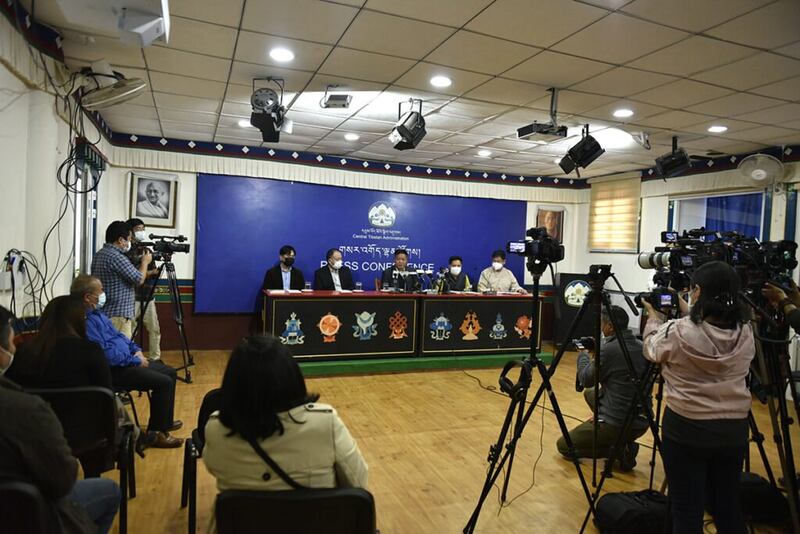Claims by China that 70 years of Beijing’s rule have improved Tibetans’ lives and that Tibet has always belonged to China distort present-day realities and ignore historical facts, Tibet’s India-based exile government said this week in a new report.
In a report released on Thursday, a day before China’s Oct. 1 National Day, the Dharamsala, India-based Central Tibetan Administration (CTA) refuted claims made by China in a White Paper, “Tibet Since 1951: Liberation, Development and Prosperity,” released in May.
“It is not 70 years of liberation, but in fact 70 years of suppression and oppression," Tibet's exile leader Sikyong Pema Tsering said at an event held to launch the CTA report. "In the last 70 years, the Chinese government has constantly subjugated the Tibetans inside Tibet in the name of infrastructure development and evolution."
China has maintained its rule in Tibet only by establishing “an oppressive regime that uses force and the instillment of fear among the people,” the CTA said in its report, titled “Tibet: 70 Years of Occupation and Oppression.”
“Today, the subjugation of Tibetans is pursued by means of increased securitization, intensified surveillance and a narrative on development, all of which are used as a political tool to integrate Tibet with China,” the exile government said.
Chinese rule in Tibet “bears all the fundamental characteristics of colonialism,” the CTA said.
“It relies, as other colonial regimes have, on the narratives of superiority and virtue of Chinese culture and ideology and the ‘backwardness’ of the Tibetan ‘Other.’”
Claims by Beijing that Tibet has always been a part of China come only from relationships between the Dalai Lamas—Tibet’s national and spiritual leaders—and the rulers of Mongol and Manchu empires that had themselves conquered China centuries before, according to the report.
“Contrary to China’s claim, Tibet was not historically a part of China, but was seized by force as the People’s Liberation Army invaded Tibet from 1949 to 1951. The claim that Tibet was ‘liberated’ is part of a narrative aimed at legitimizing what was and continues to be an illegal occupation of Tibet,” the CTA said.

Masters of the Country
In its White Paper released in May, Beijing claims that “People in Tibet enjoy the right to be masters of the country and the region in accordance with the law,” and that under Chinese rule Tibet has enjoyed “rapid and sustained growth thanks to social harmony and stability.”But China has long denied the Tibetan people the right and freedom to develop their country according to their vision and needs,” the CTA said in its report, adding, “Since occupation, China has been on a looting spree in Tibet: logging Tibetan timbers, mining Tibetan mineral resources, [and] damming and diverting Tibetan rivers.”
Tibetans are constantly required to show gratitude to the Chinese government as a minority population happy for Beijing’s help, the exile government said.
“[And] any perceived failure by the Tibetans to show subordination is seen not only as a sign of ingratitude but also as a political crime which needs to be corrected with coercion and re-education.”
Finally, claims by Beijing that it protects and promotes use of the Tibetan language are contradicted by education policies mandating classroom instruction in Chinese, with school graduates who lack Chinese language skills increasingly marginalized in professional occupations.
“The education policy implemented by the Chinese government not only downgrades the use of the Tibetan language, but also aims at eradicating the Tibetan identity,” Sikyong Penpa Tsering said in remarks at Thursday’s launch of the report.
“Tibetan graduates are facing increasing difficulty finding jobs,” Tsering said.
China’s repeated assertions that it has “peacefully liberated” Tibet from feudal and backward rule over the last 70 years are contradicted by the violence of its conquest and occupation, according to the CTA report.
“In short, the euphemism ‘peaceful liberation’ is similar to the image propagandized and popularized by China today, where the phrase ‘Peaceful Rise’ of China is sold in the market.”
“In reality, the rise of China is not peaceful at all. Rather it has been violent, with increasing repression in Tibet, East Turkestan, Southern Mongolia and now Hong Kong,” the CTA said.
Reported by Lobsang Gelek for RFA’s Tibetan Service. Translated by Tenzin Dickyi. Written in English by Richard Finney.
